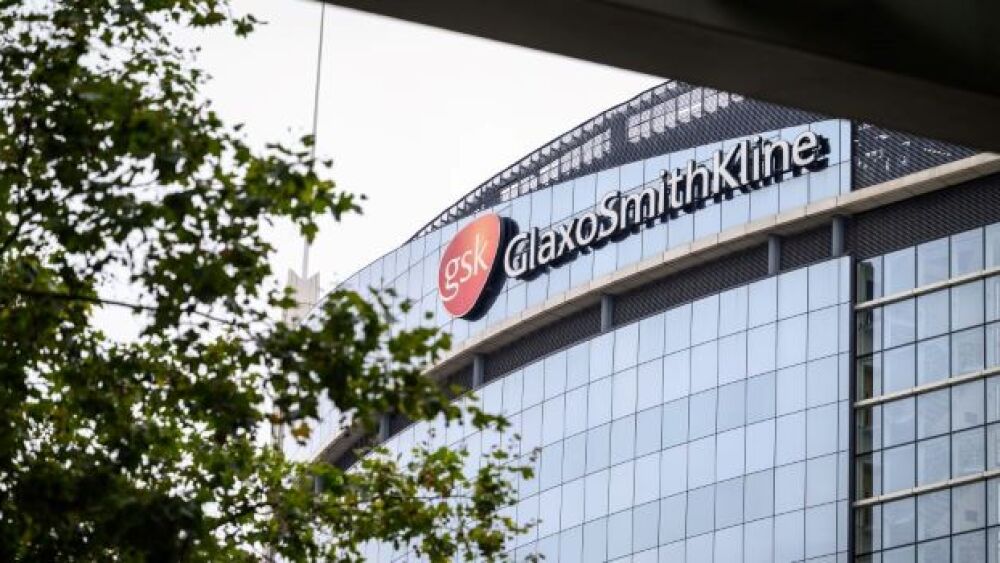GlaxoSmithKline said early research shows its monoclonal antibody is demonstrating efficacy against the newest strain of COVID-19.
Leon Neal/Getty Images
As the Omicron variant continues to spread globally, researchers are scrambling to identify therapies that may prevent infections or reduce the risk of severe infections. This morning, GlaxoSmithKline said early research shows its monoclonal antibody is demonstrating efficacy against the newest strain of COVID-19.
This morning, GSK and its partner Vir Biotechnology announced that pre-clinical testing shows that sotrovimab, a monoclonal antibody authorized for use in mild to moderate COVID-19 by both the U.S. Food and Drug Administration (FDA) and the U.K. government, is effective against Omicron. The companies said the data shows sotrovimab retains activity against key mutations in the new strain, including those found in the binding site of the monoclonal antibody treatment.
George Scangos, Ph.D., chief executive officer of Vir Biotechnology, said when sotrovimab was being developed, company scientists kept potential virus mutations in their minds.
“By targeting a highly conserved region of the spike protein that is less likely to mutate, we hoped to address both the current SARS-CoV-2 virus and future variants that we expected would be inevitable,” Scangos said in a statement. “This hypothesis has borne out again and again—with its ongoing ability to maintain activity against all tested variants of concern and interest to date, including key mutations found in Omicron, as demonstrated by pre-clinical data. We have every expectation that this positive trend will continue and are working rapidly to confirm its activity against the full combination sequence of Omicron.”
GSK R&D Chief Hal Barron, M.D., said these early pre-clinical results support the view of the two companies that sotrovimab will be able to maintain efficacy against emerging strains of SARS-CoV-2. Barron, also chief scientific officer, said he is pleased by the results in tests against Omicron, a treatment option that can help patients infected with the virus. He noted the companies are working on expanding the availability of sotrovimab across the globe.
To date, sotrovimab has demonstrated ongoing activity against all tested variants of concern and interest defined by the World Health Organization (WHO), GSK said this morning. GSK and Vir are completing in vitro pseudo-virus testing that is expected to confirm the neutralizing activity of sotrovimab against the combination of all the Omicron mutations. The companies hope to provide an update on these tests by the end of 2021.
In November, the U.S. government announced plans to acquire $1 billion worth of sotrovimab. GSK is expected to meet the supply of the monoclonal antibody by Dec. 17.
In addition to its continuing research against COVID-19, GSK also continues to aim at another deadly infectious disease, HIV. The company, which will soon split into two business entities, hopes to develop a cure for HIV within the next eight years by 2030. Bloomberg reported, the company outlined its goal during an investor conference last month.
Kimberly Smith, M.D., head of Research and Development at HIV-focused ViiV Healthcare, established through a partnership of GlaxoSmithKline, Pfizer, and Shinogi Limited, said the company aims to have a cure for the disease by 2030. In an earlier interview with BioSpace, Smith highlighted the advances made in treating HIV and pointed to some successes in two patients who became HIV-free through rigorous treatment options. She said that has shown what is possible in the field.
Also this week, GSK and the University of Oxford forged a five-year collaboration to improve the speed of research and development of new medicines. The collaboration forms the Oxford-GSK Institute of Molecular and Computational Medicine, which will build on advances in genetics, functional genomics, and machine learning.
With an initial focus on neurological diseases that include Alzheimer’s and Parkinson’s, the institute will assess new genetics, proteomics, and digital pathology approaches to understand detailed patterns of disease that vary among individual patients. These diseases include multiple sclerosis, frontal temporal dementia, and amyotrophic lateral sclerosis.
The new institute has been backed by a nearly $40 million investment from GSK. The progress made by the institute will benefit GSK’s own drug development programs that harness data regarding genetically informed drug targets generated from its collaborations with 23andMe and U.K. Biobank.





